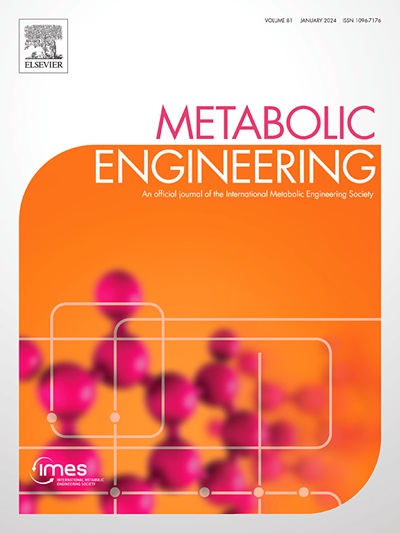Insights into the methanol utilization capacity of Y. lipolytica and improvements through metabolic engineering
IF 6.8
1区 生物学
Q1 BIOTECHNOLOGY & APPLIED MICROBIOLOGY
引用次数: 0
Abstract
Methanol is a promising sustainable alternative feedstock for green biomanufacturing. The yeast Yarrowia lipolytica offers a versatile platform for producing a wide range of products but it cannot use methanol efficiently. In this study, we engineered Y. lipolytica to utilize methanol by overexpressing a methanol dehydrogenase, followed by the incorporation of methanol assimilation pathways from methylotrophic yeasts and bacteria. We also overexpressed the ribulose monophosphate (RuMP) and xylulose monophosphate (XuMP) pathways, which led to significant improvements in growth with methanol, reaching a consumption rate of 2.35 g/L in 24 h and a 2.68-fold increase in biomass formation. Metabolomics and Metabolite Flux Analysis confirmed methanol assimilation and revealed an increase in reducing power. The strains were further engineered to produce the valuable heterologous product resveratrol from methanol as a co-substrate. Unlike traditional methanol utilization processes, which are often resource-intensive and environmentally damaging, our findings represent a significant advance in green chemistry by demonstrating the potential of Y. lipolytica for efficient use of methanol as a co-substrate for energy, biomass, and product formation. This work not only contributes to our understanding of methanol metabolism in non-methylotrophic organisms but also paves the way for achieving efficient synthetic methylotrophy towards green biomanufacturing.
解脂芽孢杆菌甲醇利用能力的研究及代谢工程改进。
甲醇是一种有前途的可持续的绿色生物制造替代原料。酵母脂解耶氏酵母为生产多种产品提供了一个多功能平台,但它不能有效地利用甲醇。在这项研究中,我们通过过度表达甲醇脱氢酶来改造脂肪瘤,然后结合来自甲基营养酵母和细菌的甲醇同化途径来利用甲醇。我们还过度表达了单磷酸核酮糖(RuMP)和单磷酸木糖(XuMP)途径,这导致了甲醇对生长的显著改善,在24小时内达到2.35 g/L的消耗率,生物量形成增加了2.68倍。代谢组学和代谢物通量分析证实了甲醇同化,并显示还原能力增加。进一步对菌株进行工程改造,以甲醇为共底物生产有价值的外源产物白藜芦醇。传统的甲醇利用过程通常是资源密集型和环境破坏性的,而我们的研究结果表明,聚脂Y.酵母具有有效利用甲醇作为能源、生物质和产品形成的共同底物的潜力,这代表了绿色化学的重大进步。这项工作不仅有助于我们了解非甲基化营养生物的甲醇代谢,而且为实现高效合成甲基化生物制造铺平了道路。
本文章由计算机程序翻译,如有差异,请以英文原文为准。
求助全文
约1分钟内获得全文
求助全文
来源期刊

Metabolic engineering
工程技术-生物工程与应用微生物
CiteScore
15.60
自引率
6.00%
发文量
140
审稿时长
44 days
期刊介绍:
Metabolic Engineering (MBE) is a journal that focuses on publishing original research papers on the directed modulation of metabolic pathways for metabolite overproduction or the enhancement of cellular properties. It welcomes papers that describe the engineering of native pathways and the synthesis of heterologous pathways to convert microorganisms into microbial cell factories. The journal covers experimental, computational, and modeling approaches for understanding metabolic pathways and manipulating them through genetic, media, or environmental means. Effective exploration of metabolic pathways necessitates the use of molecular biology and biochemistry methods, as well as engineering techniques for modeling and data analysis. MBE serves as a platform for interdisciplinary research in fields such as biochemistry, molecular biology, applied microbiology, cellular physiology, cellular nutrition in health and disease, and biochemical engineering. The journal publishes various types of papers, including original research papers and review papers. It is indexed and abstracted in databases such as Scopus, Embase, EMBiology, Current Contents - Life Sciences and Clinical Medicine, Science Citation Index, PubMed/Medline, CAS and Biotechnology Citation Index.
 求助内容:
求助内容: 应助结果提醒方式:
应助结果提醒方式:


